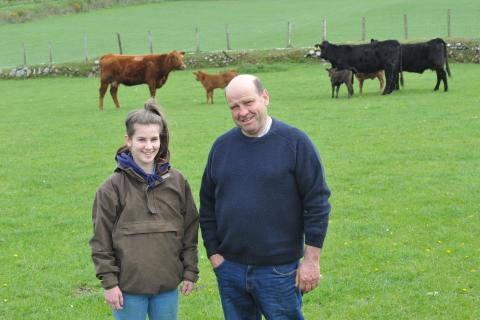10 May 2019
The 80-cow Stabiliser herd at Orsedd Fawr Farm, a 243 hectare (ha) Farming Connect Demonstration Site near Pwllheli, is run on a rotational grazing system across half the farm.
Farmers Gwyn and Delyth Parry had set a target of finishing beef off grass by 18 months of age at 600kg but admit it is a “huge challenge’’.
To make this work, animal health and grassland management must be spot on - due to poor grass growing conditions in 2018 only 25% of steers on grass hit targets for age and weight.
The Parrys have now reached maximum stocking capacity for their organic system – they also run a flock of 500 sheep.
With no room for growth on stock numbers, they now aim to increase returns from their beef enterprise by enhancing the value of their stock.
To achieve their target of finishing all progeny off grass at 18 months, they are trialling artificial insemination in half the herd.
“AI will give us the flexibility to breed for specific traits, be it maternal or terminal,’’ says Mr Parry.
“The performance of the AI-sired calves will be monitored and compared with our stock bull calves to see if the added cost and labour is justified.
“We are aiming for high-reliability proven sires that will give us calves on the ground that will hit their performance targets and leave a profit.’’
To make the system work in a grass-based system and on an off-lying farm, new technology to identify when cows are in heat is being trialled as part of a Farming Connect project.
A vasectomised bull has been fitted with a heat detection collar, linked to RFID tags on the cows, to detect spikes in activity.
Mr Parry suggests there are obvious benefits to this approach, not least facilitating rapid genetic improvement in the herd.
“With artificial insemination we have access to the genetics of top ranking bulls,’’ he says.
The cows will be inseminated at an off-lying farm six miles from Orsedd Fawr therefore the heat detection alert system is vital, says Mr Parry.
“I will receive alerts on my mobile phone, providing information on the animals that need to be inseminated by the technician the following morning.
“We have good handling facilities and we run the cattle on a paddock system very similar to a dairy farm so we can move them quite easily with an electric fencing system when we need to.
“Getting them in for AI will be the biggest challenge but they are quite docile.’’
Mr Parry admits the system won’t be cheap, one straw together with insemination services will cost around £30, but he is confident that this will be recouped by the benefits of the estimated breeding values (EBVs) he is selecting for.
He will use AI for six weeks before introducing a Stabiliser stock bull.
Heat detection is extremely important when it comes to implementing a successful AI programme, says Gethin Prys Davies, Farming Connect’s Red Meat Technical Officer in North Wales.
“Beef animals mostly show signs of heat more clearly compared to dairy cows and have less metabolic pressures, therefore good conception rates can be expected with AI if done well,’’ he says.
Advantages of using AI:
- A range of proven, genetically superior sires of different breeds can be used
- It allows selective mating of cows or heifers to improve specific traits within the herd, such as using proven easy-calving bulls on replacement heifers
- It offers higher reliability
- The risk of bull infertility is eliminated
Disadvantages of AI:
- Time consuming
- Without heat detection technology, close monitoring of animals is required
- Good handling facilities are needed for insemination
- Cows and heifers need to be gathered when bulling

